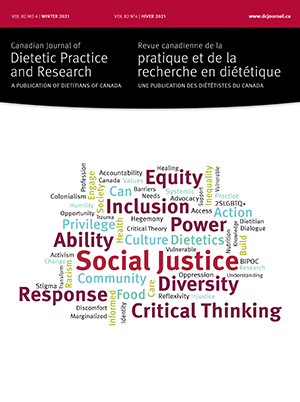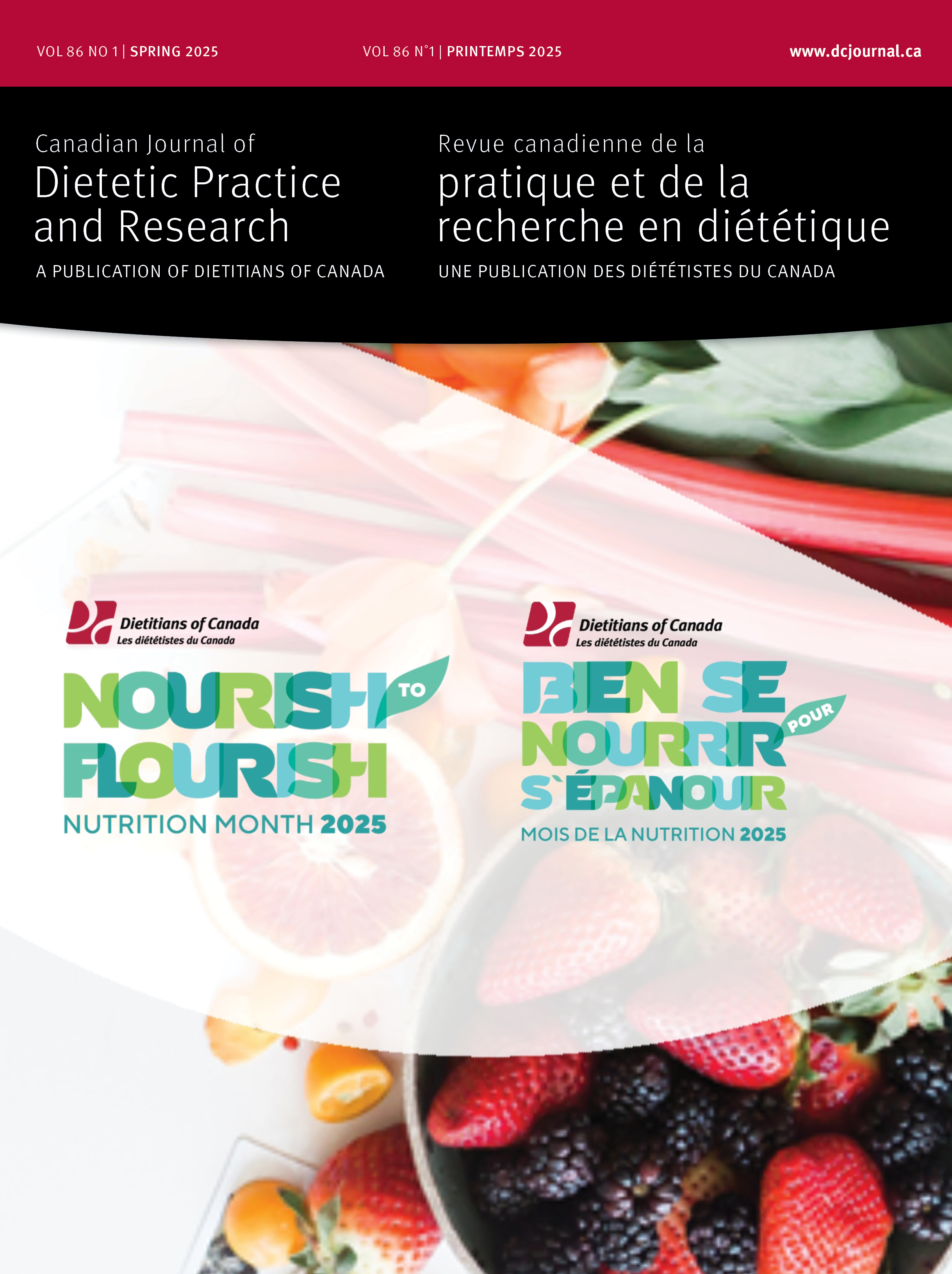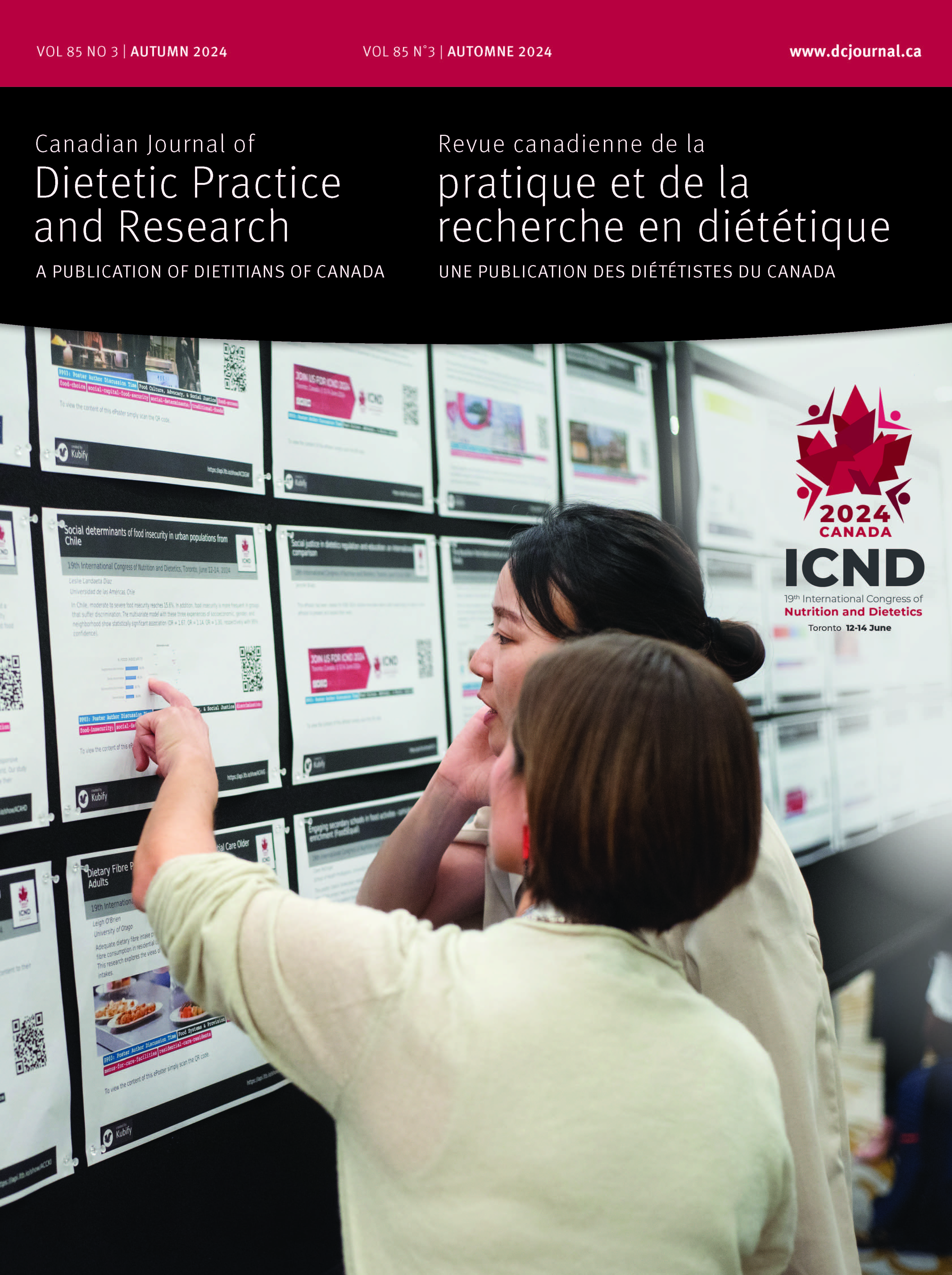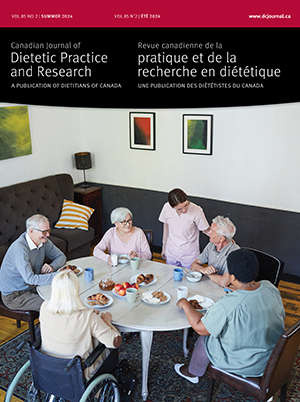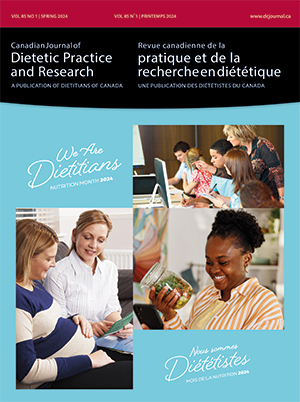Volume 82 • Number 4 • December 2021
Editor’s Message
Invited Commentary
Recent world events have shone a spotlight on the social and structural injustices that impact the lives, health, and well-being of individuals and communities under threat. Dietitians should be well positioned to play a role in redressing injustice through their individual and collective “response abilities”, that is, the combination of responsibility for and ability to be responsive to such injustices due to the varying privilege and power that dietitians have. However, recent research shows that dietitians report a lack of knowledge, skill, and confidence to take on such roles, and that dietetic education includes little knowledge- or skill-based learning that might prepare dietitians to do so. This primer aims to introduce readers to concepts that are fundamental to socially just dietetics practice, including privilege, structural competence, critical reflexivity, critical humility, and critical praxis. We assert that when implemented into practice and used to inform advocacy and activism these concepts enhance dietitians’ individual and collective response ability to redress injustice.
Research
OPEN ACCESS
Purpose: The study aimed to determine current practice, barriers, and enablers of foodservices in Canadian hospitals relative to guiding principles for best practice to prevent malnutrition.Methods: Foodservice managers completed a 55-item cross-sectional, online survey (closed- and open-ended questions).Results: Survey responses (n = 286) were from diverse hospitals in all Canadian regions; 56% acute care; 13% had foodservices contracted out; and 60% had a reporting structure combined with clinical nutrition. Predominantly, foodservice systems were 43% in-house versus 41% pre-prepared, 46% cook–serve food production, 64% meals assembled centrally (on-site), and 40% non-selective menus with limited opportunities for patient choice in advance or at meals. The “regular menu” (44%) was most commonly served as 3 meals, no snacks at specific times. Energy and protein-dense menus were available, but not widespread (9%). Daily energy targets ranged from 1200 to 2400 kcal and 32% of respondents viewed protein targets as important. The number of therapeutic diets varied from 2 to 150.Conclusions: Although hospital foodservice practices vary across Canada, the survey results demonstrate gaps in national evidence-based practices and an opportunity to formalize guiding principles. This work highlights the need for standards to improve practice through patient-centered, foodservice practices focused on addressing malnutrition.
Purpose: To describe the energy (E), sodium, saturated fat, sugar, and fibre intakes of a sample of children attending regulated childcare (RCC) in Nova Scotia.Methods: Nutrient analyses from 79 food records were compiled and grouped by intakes in and outside of RCC, age, sex, location of the RCC (urban or rural), and nutrient intake data. Descriptive statistics and independent t tests were conducted.Results: Mean E and macronutrients were within recommended ranges and, for days attending RCC, 45%E was consumed in RCC. Saturated fat intake was 12%E on average. Mean sodium intake exceeded or approached the tolerable upper limit for 3-year olds (1726 mg/day) and 4–5-year olds (1770 mg/day), respectively. Total sugar was 27%E intake and significantly more sugar was consumed outside RCC and by boys compared to girls. Mean daily dietary fibre intake was below recommended levels (15 g/day).Conclusions: On average dietary intakes of children exceeded recommendations for sodium, saturated fat, and sugar with higher intakes outside RCC. The foods provided by RCC have a positive influence on children’s intakes, but given the pervasiveness of sugar and sodium in the food environment and the challenges of feeding children, support is needed for both RCC and families to encourage healthy eating behaviours for positive growth and development.
Purpose: The COVID-19 pandemic has impacted the lives of lesbian, gay, bi, trans, queer, and other groups (LGBTQ+) within Canada. This research aimed to explore the experiences of LGBTQ+ Canadians in relation to their nutritional needs, practices, and supports during the COVID-19 pandemic.Methods: The qualitative study was framed within a poststructuralism and queer theory paradigm and consisted of an online questionnaire. Participants were recruited and asked to complete open-ended questions. Responses were coded using thematic analysis.Results: Seventy participants completed the questionnaire. Data analysis resulted in 3 major themes, including (i) (dis)comforts of food and eating, (ii) shifting views of food and food practices, and (iii) what supports? The themes revealed that many LGBTQ+ individuals experienced stress and anxiety during the COVID-19 pandemic. It was a time in which their views and practices of food, cooking, and eating were changed. Nutritional supports were discussed in terms of family, friends, and partners.Conclusion: The findings highlight the complexity to the meanings people give to food, cooking, and eating during stressful times. It is recommended that dietitians familiarize themselves with the experiences of LGBTQ+ people, especially during times of global health emergencies to ensure equitable health care for LGBTQ+ communities.
Perspectives in practice
This qualitative study explored the impressions of pregnant Canadian women toward Canada’s Food Guide (CFG) snapshot released in January 2019. Semi-structured interviews were conducted with 8 physically active pregnant women. Interviews were digitally recorded, transcribed verbatim, and analyzed using thematic analysis. Three themes emerged: (i) pregnancy changes what I eat; (ii) what is healthy to me? and (iii) a connection with people and food. Pregnancy was the primary factor influencing dietary changes, and messages in the snapshot reinforced some dietary behaviours that participants had already incorporated. Participants wanted information specific to pregnancy but were not aware of available resources pertaining to nutrition on existing websites. Dietitians and other health care professionals should take steps to raise awareness of and ensure wider dissemination of reliable resources on healthy eating during pregnancy including Canada’s Food Guide website.
Adults with amyotrophic lateral sclerosis (ALS) and primary lateral sclerosis (PLS) may develop swallowing difficulties and elect to receive an enterostomy feeding tube for nutrition support. Blenderized tube feeding (BTF) appeals to those interested in a homemade enteral nutrition option, but there are concerns of feeding tube occlusion and limited research on this potential risk. Therefore, our purpose was to determine the frequency of, and risk factors for, feeding tube occlusions among adults with ALS or PLS who use BTF. For this retrospective study, the electronic medical records of tube-fed adults with ALS or PLS who received outpatient care at a provincial ALS clinic during a two-year period were reviewed (n = 651). There were 97 tube-fed patients identified, of which 20 (21%) used BTF. Average duration of BTF use was 11.25 ± 7.5 months. Seven subjects (35%) used BTF exclusively, while 13 (65%) used a combination of BTF and commercial enteral formula. All received BTF by gastrostomy tube, sized 14 to 24 French. BTF administration methods and compliance with water flush recommendations varied. Despite the perceived risk of feeding tube occlusions with blenderized tube feeding, no occlusions were found to have occurred in this study.
Review
A concept analysis using the method of Walker and Avant was undertaken to clarify the concept of food insecurity in older adults in Canada and the United States. A literature review was undertaken to conduct a concept analysis of food insecurity in older people. Food insecurity is associated with multiple negative health outcomes and may be experienced differently by older adults as compared to younger adults. It is therefore important to understand the concept of food insecurity as is relates to older adults. Four defining attributes of food insecurity in older adults in Canada and the United States were identified: (i) inability to acquire or prepare enough food, (ii) compromising on food quality or preference, (iii) uncertainty or anxiety around the ability to acquire or prepare food, and (iv) socially unacceptable or non-normative practices. These attributes may allow for improved policies and programs aimed at addressing food insecurity in older adults by better meeting the needs of older individuals. Additional research into food insecurity as experienced by Canadian and American older adults could help to further clarify the concept.


